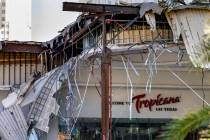Okada tries to block special shareholders meeting
Kazuo Okada opened a new front in the sprawling legal war with Wynn Resorts Ltd. by raising questions of financial impropriety by company chairman and CEO Steve Wynn.
In the latest lawsuit between the two sides filed late Thursday, Okada requested that the U.S. District Court in Las Vegas stop the Feb. 22 special shareholders meeting to oust him from the board of directors. In court papers, Okada's attorneys wrote that the proxy statement sent to shareholders contained "numerous materially false and misleading statements ... as part of (Wynn's) effort to avoid an honest and informed shareholder vote."
Okada's attorneys repeated their version of how the once-close personal and business relationship between Okada, the Japanese gaming tycoon who was formerly the company's largest shareholder, and Steve Wynn deteriorated into a loud and public feud over the past couple of years. The history has appeared in other litigation.
This time, however, Okada included a copy what he called the "Cotai Documents," concerning a $50 million payment the company made to a company controlled by somebody in Macau named Ho Ho. In a Thursday letter, Okada urged other board members to launch an investigation into what he termed "a series of highly suspicious transactions." The payment came after the Macau government approved in May the company's plan for a $4 billion resort along Macau's Cotai Strip, as first reported in the Wall Street Journal in June.
However, Okada added, "I cannot verify the authenticity of the Cotai Documents, and that is part of why the board should have these matters investigated."
Wynn senior vice president of marketing Michael Weaver said in a statement, "This is just the latest ploy in Mr. Okada's increasingly desperate campaign to divert attention from the real issue - his misconduct as a director of Wynn Resorts."
In an interview with the Journal in June, Wynn explained the deal involving Ho Ho as a legitimate component of the Cotai development that was checked out by attorneys.
In addition, the company sent a new letter on Friday urging shareholders to vote to oust Okada for alleged "improper activities" in connection with a casino resort he is developing in the Philippines. Keeping him on the board, the company said, could jeopardize its gaming licenses because of his "apparent violation of U.S. anti-corruption laws and in contravention of the company's code of conduct."
Under Nevada law, the ouster would succeed only if it wins a two-thirds vote of all shares. The company filed a similar preliminary proxy in March, just a couple of weeks after it forcibly redeemed Okada's 19.7 ownership stake at a 30 percent discount, but let it lie dormant until December.
The Cotai Documents purport to detail a complex string of transactions involving different entities dating back to 2005 pertaining to land rights in Macau. The final form of the deal, as Okada interpreted it, called for paying a company called Tien Chiao Entertainment Ltd. once Wynn obtained Macau government approval for a gaming concession.
Ho Ho signed on behalf of Tien Chiao. According to Okada, nobody has established who Ho Ho is.
As part of his message to the board, Okada included a summary of questions about each of three agreements involving Wynn and Ho Ho.
In an interview with the Journal in June, Steve Wynn defended the deal as obtaining critical land for the latest project. He said he was directed to Ho Ho by Edmund Ho, Macau's former top official and apparently unrelated.
The company then investigated Ho Ho and his associates before doing anything. "This whole business of the Foreign Corrupt Practices Act - we were schooled in this," he said at the time. "Right away we started checking everybody with Mr. Ho Ho, and everybody came up dandy."

















